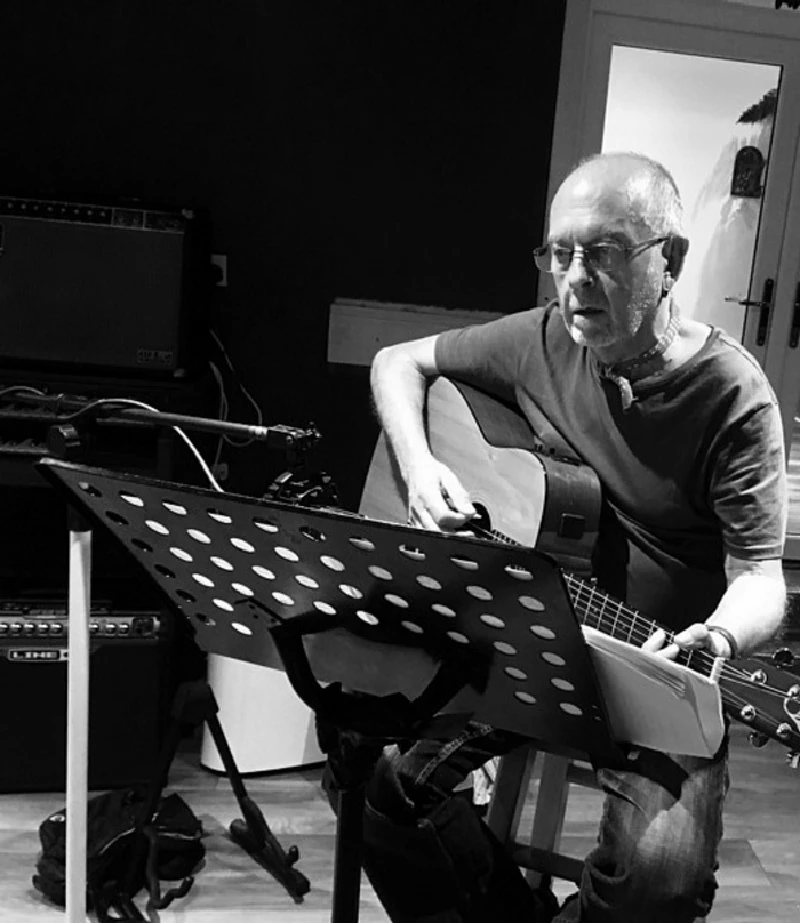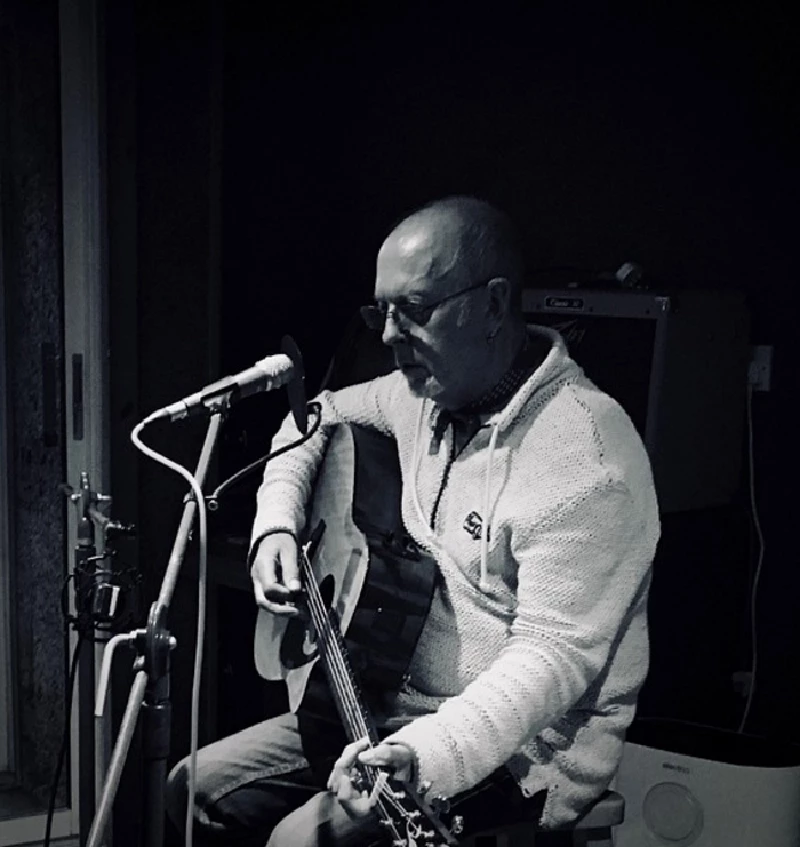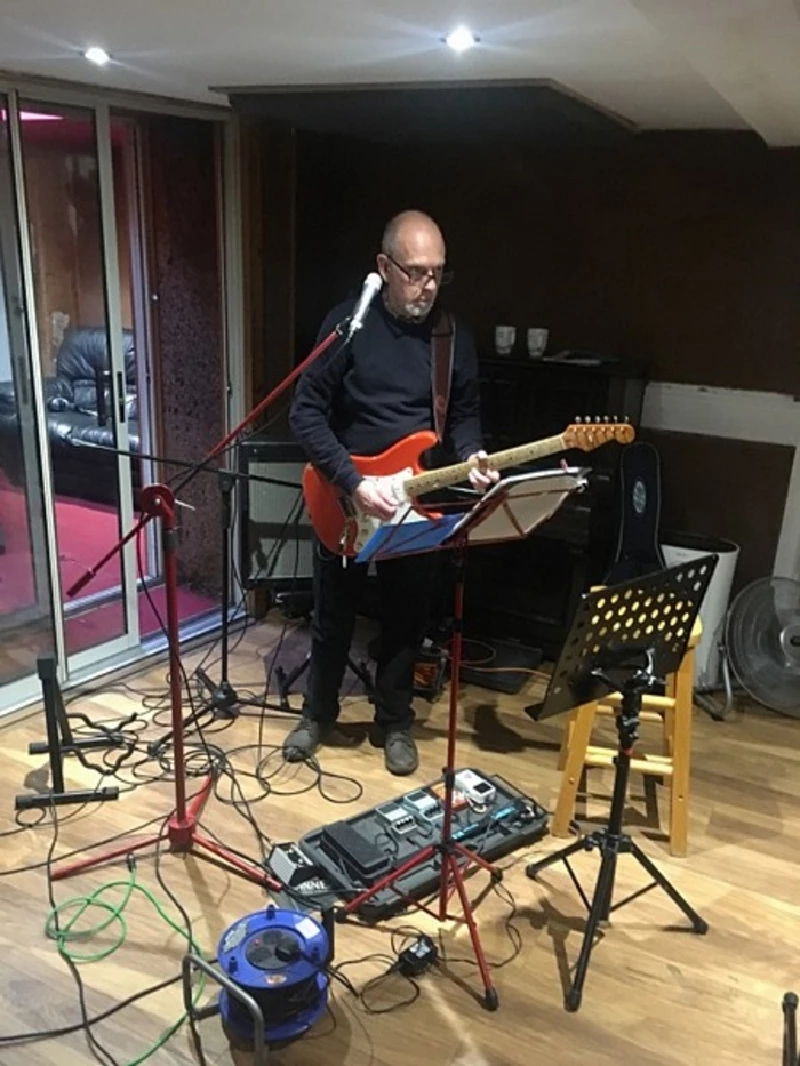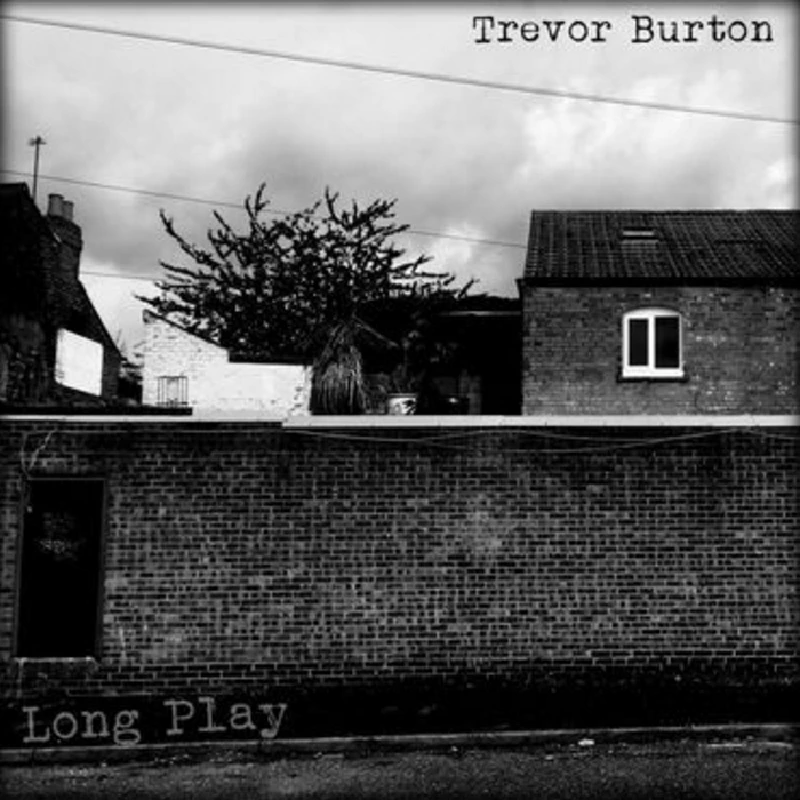Trevor Burton - Interview
by John Clarkson
published: 10 / 5 / 2018

intro
Former Move guitarist and vocalist speaks to John Clarkson about his debut solo album and acoustic album 'Long Play', which is being released on limited edition vinyl.
Trevor Burton is best known for being one of the original members of the psychedelic/pop outfit The Move. The Birmingham-formed group, which also featured Roy Wood (vocals, guitars) and Bev Bevan (drums, vocals) who went on to further fame respectively with Wizzard and the Electric Light Orchestra, had a string of chart entries in the late 1960s. Burton, who also contributed vocals, started out as a guitarist with The Move when it formed in late 1965, before switching to bass in 1968 after its bass player Ace Kefford quit. He appeared on its self-titled 1968 debut album, and the Top Five singles ‘Night of Fear’, ‘I Can Hear the Grass Grow’, ‘Flowers in the Rain’ and ‘Fire Brigade’, but left The Move in January 1969 shortly after it had its only number one hit with ‘Blackberry Way’. Since then Burton has gone to work with a variety of rock and blues acts including the short-lived super-group Balls (which also featured Moody Blues/Wings guitarist Denny Laine and Plastic Ono Band drummer Alan White), the Pink Fairies and the Steve Gibbons Band, before eventually forming his own group, the Trevor Burton Band. Burton, who is now aged 69, will be releasing his debut solo album, ‘Long Play’, for Record Store Day on April 21st in a limited edition of 1,000 copies. ‘Long Play’, which is coming out on Gray Sky Records, is a departure for Burton who is renowned for his electric guitar work in that it is an acoustic album. A beautifully stark affair, it features just the gravel-voiced Burton and his guitar on most of its tracks, but also has whispers of Hammond Organ interloping across a few of its numbers. The album opens with a Trevor Burton original, the elegiac ‘Hit and Run’ in which he reflects on his years in The Move and as a 60’s pop star. There is later on another self-penned number, the brooding and similarly reflective 'When It All Comes Down'. The other nine tracks are covers of songs by contemporary artists, and include Tom Petty’s ‘Wildflowers’, Neutral Milk Hotel’s ‘In the Aeroplane over the Sea’, Vic Chessnut’s ‘Flirted With You All My Life’, Pearl Jam’s ‘Just Breathe’ and album closer the Mountain Goats’ ‘Andrew Eldritch is Moving to Leeds’. Pennyblackmusic spoke to Trevor Burton about ‘Long Play’. PB: It has been said that the art of a good cover is to at one level remain true to the original yet at the same time do something radical with it. It seems that you have done that here with these acoustic versions. Was that you were aiming for with ‘Long Play? TB: I really just sat down with my guitar and performed these songs - which are all great songs that are meaningful to me - in my own way. I think that resulted in the outcome you describe: a performance that is both true to the original but, because I'm performing it as it feels right to me, it also has substantial, perhaps radical, differences that make my versions, to me at least, unique and special. I hope people enjoy it as much as I do. PB: All the covers on this album are contemporary songs, all written and initially recorded during the last twenty years. Neutral Milk Hotel’s ‘In the Aeroplane Over the Sea’ which came out in 1998 is probably the oldest song while the last track, the Mountain Goats cover, came out originally last year. Was that a conscious decision and how did you first discover these songs? Were they all tracks in your record collection? TB: No, it wasn't really a conscious decision. When I was approached by Gray Sky Records to try something new, we talked a lot about the different styles we could choose and what kind of songs we would like to play. We agreed something new and fresh was important. Michael Hession of Gray Sky gave me about forty song to think about, almost all of which were written by young songwriters in the last decade or so, with a couple exceptions that are a little older. Apart from 'Wildflowers', I didn't know any of them. They weren't previously tracks in my collection, but they are now. I look forward to hearing and learning about more modern music, as I very much enjoy the original versions of all of these songs, and a lot that didn't make the record. PB: Tom Petty’s ‘Wildflowers’ is the best known song, but there are some real obscurities there , notably Radiator Hospital’s ‘I’m Alright’ and Al Scorch’s ‘Poverty Draft’. Is one of the aims of this record to hopefully introduce your audience to some excellent new music and to hopefully make them look out the originals? TB: Mostly, I chose the songs that I thought were best and would fit together well on a record. That being said, as I was getting to know these songs, I thought it would be great if my audience and my generation takes a listen to some of the newer, lesser known songwriters that I included in this record. In Britain, it's not very easy to find most of these artists or their music and I think, given the chance to listen, people here, of all generations, would really like the originals. I certainly do. PB: Long Play’ opens with your own song ‘Hit and Run’ which reflects on your early years with the Move and in bands. You describe a world of “death by drugs and booze for some”, in which lovers and friends are left behind and in which you are burnt out by 25, all in the pursuit of fame. Do you see your experiences in the 60’s and early 70’s now as bittersweet at best? TB: Bittersweet, no. Not at all. They were great and special times - both sad and happy times for us all, of course - but, for me, I'm not bitter and I don't regret a thing. I have been lucky to have a career playing music that I love, with hit songs and the ability to travel to perform for all different people around the world. I couldn't ask for more. Except maybe some of the royalties or any money at all for my work with the Move, of which I received none. That does piss me off, I admit. But that was the way it was back then and I didn't play music for money or fame; I played for the love of music, and after fifty years I still do. The new album is great and I loved recording it. There's nothing to be bitter about in such an amazing life. PB: The Move’s rise was very fast. You were taken down to London by your first manager Tony Secunda, played your infamous residency at the Marquee Club and had a massive number two hit with ‘Night of Fear’, all within a year of forming. Do you think that in hindsight it all happened too fast for them? TB: Yes, it all happened very fast. We were all young and naive and loving the ride for what it was. We weren't business men, we were musicians and kids having a trip. It wasn't until much later we turned around and thought, "Hang on a sec! Where's the money?" But like I said before, that's the way it was back then, and I wouldn't give up my seat on the ride for anything. No regrets. PB: If there are common threads to the eleven songs on this album, they are that youth is but brief, that death is always in the backdrop and that you have as a result of that to seize the day. Would you agree? Was that a deliberate decision when you were deciding which songs to go for with this album or did that happen by chance? TB: Yes, I think that is a good assessment of 'Long Play'. When we were deciding which songs to include on the record, we were really looking for good songs that I could relate with, and that I felt my audience (and perhaps a new audience) could relate with as well. I do not think it was a deliberate choice to be about these bigger themes of youth and life and death, but it wound up that way because of the times we are living in, and that most of these songs were written after the 11th of September and its aftermath: times of war and change. So, it makes sense that these songs, put together, fit a theme that is somewhat dark, as our times are somewhat dark. But there is optimism in these songs, both as they are written and as I perform them. It is just a little hard to find if you don't look. Which is true about optimism in a lot of things in today's world. PB: The album cover of ‘Long Play’ shows a black and white photo of the top of a suburban house behind a brick wall. Was that photograph taken in Birmingham? Does that house have particular significance to you? TB: The front cover is a photograph of Rain Studios, in King's Heath, Birmingham where 'Long Play' was recorded. The studio used to be owned by Bob Lamb of the Steve Gibbons Band, and was known as Highbury Studios, as it is located on Highbury Road. Some well-known Birmingham bands like UB40 and Duran Duran recorded there in their early years as well.I think it represents Birmingham and how it feels today, which is how we tried to record the album to feel, too. PB: As well as doing the vinyl edition of ‘Long Play’ in 1,000 copies, you are also bringing it out on a limited edition cassette. Why have you decided to do that? TB: Because cassettes are fun and we wanted to have some fun with this record. That's what music is about, particularly rock and roll: having fun. Even though the songs on 'Long Play' are much darker and quieter than my usual style, we still had fun making them. We wanted people to have fun listening to them. It's also good, I think, to have physical product, and these days it's mostly digital. Each vinyl record and cassette comes with a free digital download code if that's how you want to listen, but we wanted to give people the opportunity to have physical product as well. PB: You are also including with the vinyl LP a three song CD EP with electric versions of songs from Phish, the White Stripes and the Weakerthans. Why did you decide to make these covers electric rather than acoustic like the others on ‘Long Play’? TB: Again, we just wanted to have some fun. 'Long Play', as I said, is quieter and darker than anything I've done before. Electric songs didn't really fit stylistically on the album itself. But I'm a rocker at heart and always will be, and we all agreed that having a few electric songs would be great fun after recording so many slower, quieter songs. And these are great, rocking songs. Ian Button, one of our producers, played drums. Dangerous Derek Wood from the Trevor Burton Band came out to play on bass; and Abby Brant, who provided keyboards and vocals on 'Long Play', did the same on the electric tracks. We put them on a separate CD EP to keep the album theme in its particular style. The CD EP has a different feel. And I think it all came out fantastic. Great fun. PB: You are doing a live in-store record appearance in Birmingham on Saturday 21st April for Record Store Day. Do you have any more plans for live work to promote ‘Long Play’ during 2018? TB: I have a schedule to play all kinds of shows throughout 2018. We'll see what people want to hear. I would love to play more acoustic sets, but I love to play electric sets, too. As long as I'm in front of an audience and they're keen to listen, I'm keen to perform. PB: Thank you.
Article Links:-
https://grayskyrec.bandcamp.com/https://www.facebook.com/grayskyrecords/
https://twitter.com/GraySkyRecords
Band Links:-
http://www.thetrevorburtonband.co.ukhttps://www.facebook.com/trevor.burton.560
https://twitter.com/TREVORBURTON1
https://en.wikipedia.org/wiki/Trevor_Burton
Picture Gallery:-



most viewed articles
current edition
Carl Ewens - David Bowie 1964 to 1982 On Track: Every Album, Every SongArmory Show - Interview with Richard Jobson
Colin Blunstone - Thalia Hall, Chicago, 16/7/2025
Bathers - Photoscapes 1
Visor Fest - Valencia, Spain, 26/9/2025...27/9/2025
Billie Eilish - O2 Arena, London, 10/7/2025
Robert Forster - Interview
Loft - Interview
John McKay - Interview
Editorial - July 2025
previous editions
Heavenly - P.U.N.K. Girl EPManic Street Preachers - (Gig of a Lifetime) Millennium Stadium, Cardiff, December 1999
Oasis - Oasis, Earl's Court, London, 1995
Beautiful South - Ten Songs That Made Me Love...
Trudie Myerscough-Harris - Interview
Pixies - Ten Songs That Made Me Love...
Simon Heavisides - Destiny Stopped Screaming: The Life and Times of Adrian Borland
Paul Clerehugh - Interview
Doris Brendel - Interview
Prolapse - Interview
most viewed reviews
current edition
Amy Macdonald - Is This What You've Been Waiting For?Sick Man of Europe - The Sick Man of Europe
Alice Cooper - The Revenge of Alice Cooper
Phew, Erika Kobayashi,, Dieter Moebius - Radium Girls
Davey Woodward - Mumbo in the Jumbo
Lucy Spraggan - Other Sides of the Moon
Blueboy - 2
Cynthia Erivo - I Forgive You
Philip Jeays - Victoria
Lapsley - I'm a Hurricane, I'm a Woman In Love
Pennyblackmusic Regular Contributors
Adrian Janes
Amanda J. Window
Andrew Twambley
Anthony Dhanendran
Benjamin Howarth
Cila Warncke
Daniel Cressey
Darren Aston
Dastardly
Dave Goodwin
Denzil Watson
Dominic B. Simpson
Eoghan Lyng
Fiona Hutchings
Harry Sherriff
Helen Tipping
Jamie Rowland
John Clarkson
Julie Cruickshank
Kimberly Bright
Lisa Torem
Maarten Schiethart